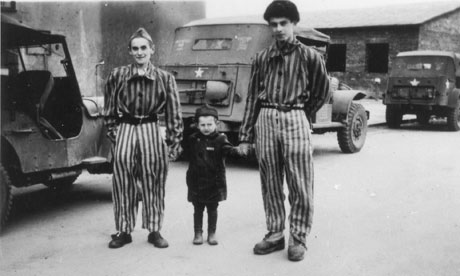
An extraordinary dispute has erupted on the eve of the republishing of communist East Germany's most widely read novel – a concentration camp drama about a group of inmates who rescue a Jewish boy from the gas chambers.
Naked Among Wolves (Nackt Unter Wölfen), by Bruno Apitz, became an anti-fascist classic after the second world war and held a place on the bookshelves of successive generations of East Germans. There are expectations that the book, which is to be presented at the London Book Fair next month, will repeat the success of another East German title, Hans Fallada's 1947 Alone In Berlin, which was a publishing sensation when an English edition came out three years ago.
Based in part on the author's eight-year imprisonment in Buchenwald, Naked Among Wolves tells of a group of communist prisoners who smuggle a Polish Jewish boy into the camp in a suitcase and protect him from almost certain death by hiding him from SS guards.
Known in the novel as Stefan Cyliak, the identity of the real "Buchenwald Kind", as he is popularly known, was later revealed to be Stefan Jerzy Zweig, a Polish boy born in the Kraków ghetto who came to Buchenwald with his father, Zacharias, when he was three, leaving after liberation in 1945. His mother and sister were both murdered at Auschwitz. Recent information, however, has revealed that – contrary to the book – Zweig was "swapped" for a 16-year-old Roma boy called Willy Blum who was sent to death in his place, almost certainly after the communists who saved him did a deal with a Nazi doctor.
The book's re-release has reignited controversy about how the Zweig story should be presented. Zweig, now 71 and a retired cameraman living in Israel, recently went to court to prevent Volkhard Knigge, the director of the Buchenwald Memorial Foundation, from ascribing his survival to what Knigge has called a "victim swap". According to Knigge: "These legends must be brought to an end." Zweig told the judge "I am not a legend", but said he felt stripped of his dignity by the foundation after it removed a plaque referring to his rescue.
"When you erase a name, you erase the person," Zweig said. "If you want, erect a plaque with the names of all the other children who were in Buchenwald … but don't erase one of them. " The court case resulted in a compromise. Zweig agreed to withdraw his claims and Knigge agreed to stop using the phrase 'Victim Swap' ("Opfertausch") in interviews about Zweig.
After his "rediscovery" in France in 1964, Zweig was feted in East Germany and took up an offer to study in the communist east, which was exploited for propaganda.
Those who know Zweig say that he is now a broken man, who has never recovered from the trauma of his early years. Bill Niven, a professor of contemporary German history at Nottingham Trent University and the author of The Buchenwald Child, told the Observer: "He [Zweig] feels personally attacked, as if he was being directly implicated in the death of the other boy. If you've learned to believe all your life that you've been rescued, but then it turns out you've survived because someone else has died, the burden of that is unimaginable. It's no wonder he's uttered the phrase: 'I really should be dead'. He is no doubt suffering from survivor's guilt." The novel, which has sold 3m copies, has been revised to include passages previously edited out, and to highlight details subtly altered to enable the story to fit pro-communist literature.
Asked about the relationship between Zweig and Apitz after the book's publication, the novelist's widow, Kiki, told the Observer: "When he met him again, Zweig was a young man. It was a shattering experience for both of them. He would have liked to have adopted him as a son, but Zweig did not want to have that sort of closeness."
• This article was amended on 29 March and 2 April 2012. The original said that a judge ruled that Knigge had to stop using the phrase "victim swap" in interviews. This has been corrected.

